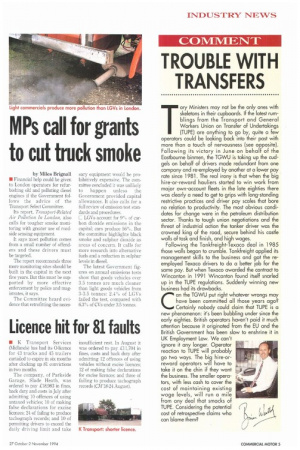TROUBLE WITH TRANSFERS
Page 7

If you've noticed an error in this article please click here to report it so we can fix it.
ory Ministers may not be the only ones with skeletons in their cupboards. If the latest rumblings from the Transport and General Workers Union on Transfer of Undertakings (TUPE) are anything to go by, quite a few operators could be looking back into their past with more than a touch of nervousness (see opposite). Following its victory in June on behalf of the Eastbourne binmen, the TGWU is taking up the cudgels on behalf of drivers made redundant from one company and re-employed by another at a lower pay rate since 1981. The real irony is that when the big hire-or-reward hauliers started to win work from major own-account fleets in the late eighties there was clearly a need to get to grips with long-standing restrictive practices and driver pay scales that bore no relation to productivity. The most obvious candidates for change were in the petroleum distribution sector. Thanks to tough union negotiations and the threat of industrial action the tanker driver was the crowned king of the road, secure behind his castle walls of task and finish, and high wages.
Following the Tankfreight-Texaco deal in 1985 those walls began to crumble. Tankfreight applied its management skills to the business and got the reemployed Texaco drivers to do a better job for the same pay. But when Texaco awarded the contract to Wincanton in 1 991 Wincanton found itself snarled up in the TUPE regulations. Suddenly winning new business had its drawbacks.
Can the TGWU put right whatever wrongs may have been committed all those years ago? Certainly nobody could claim that TUPE is a new phenomenon: it's been bubbling under since the early eighties. British operators haven't paid it much attention because it originated from the EU and the British Government has been slow to enshrine it in UK Employment Law. We can't ignore it any longer. Operator reaction to TUPE will probably go two ways. The big hire-orreward operators will have to take it on the chin if they want the business. The smaller operators, with less cash to cover the cost of maintaining existing wage levels, will run a mile from any deal that smacks of TUPE. Considering the potential cost of retrospective claims who can blame them?








































































































